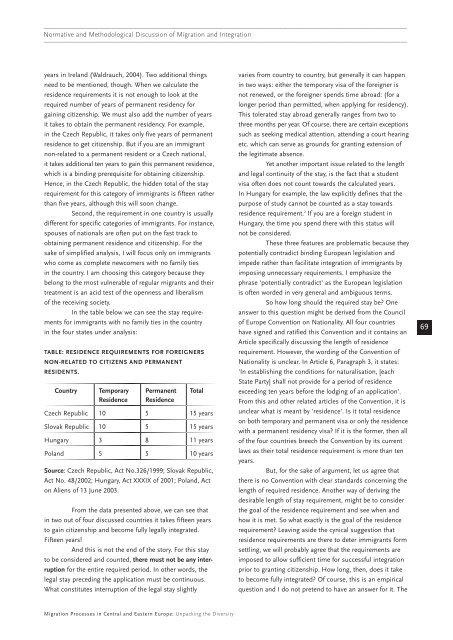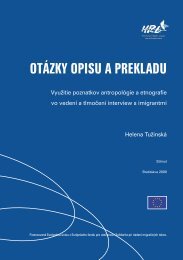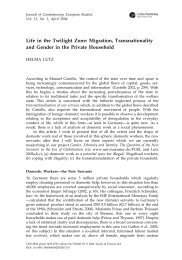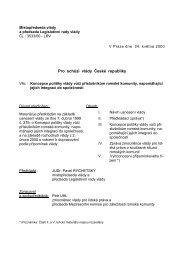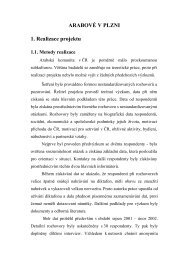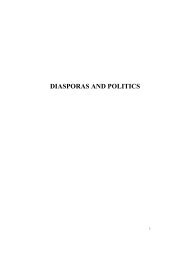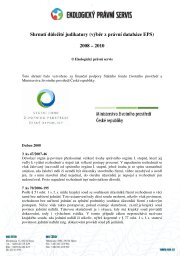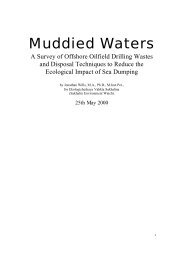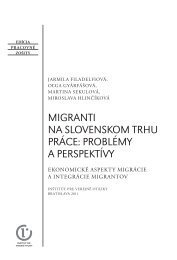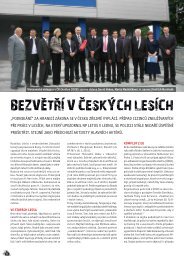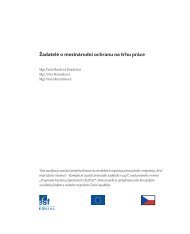Migration Processes in Central and Eastern Europe - Multiple Choices
Migration Processes in Central and Eastern Europe - Multiple Choices
Migration Processes in Central and Eastern Europe - Multiple Choices
You also want an ePaper? Increase the reach of your titles
YUMPU automatically turns print PDFs into web optimized ePapers that Google loves.
———————————————————————————————————————————————————————————————<br />
Normative <strong>and</strong> Methodological Discussion of <strong>Migration</strong> <strong>and</strong> Integration<br />
———————————————————————————————————————————————————————————————<br />
years <strong>in</strong> Irel<strong>and</strong> (Waldrauch, 2004). Two additional th<strong>in</strong>gs<br />
need to be mentioned, though. When we calculate the<br />
residence requirements it is not enough to look at the<br />
required number of years of permanent residency for<br />
ga<strong>in</strong><strong>in</strong>g citizenship. We must also add the number of years<br />
it takes to obta<strong>in</strong> the permanent residency. For example,<br />
<strong>in</strong> the Czech Republic, it takes only five years of permanent<br />
residence to get citizenship. But if you are an immigrant<br />
non-related to a permanent resident or a Czech national,<br />
it takes additional ten years to ga<strong>in</strong> this permanent residence,<br />
which is a b<strong>in</strong>d<strong>in</strong>g prerequisite for obta<strong>in</strong><strong>in</strong>g citizenship.<br />
Hence, <strong>in</strong> the Czech Republic, the hidden total of the stay<br />
requirement for this category of immigrants is fifteen rather<br />
than five years, although this will soon change.<br />
Second, the requirement <strong>in</strong> one country is usually<br />
different for specific categories of immigrants. For <strong>in</strong>stance,<br />
spouses of nationals are often put on the fast track to<br />
obta<strong>in</strong><strong>in</strong>g permanent residence <strong>and</strong> citizenship. For the<br />
sake of simplified analysis, I will focus only on immigrants<br />
who come as complete newcomers with no family ties<br />
<strong>in</strong> the country. I am choos<strong>in</strong>g this category because they<br />
belong to the most vulnerable of regular migrants <strong>and</strong> their<br />
treatment is an acid test of the openness <strong>and</strong> liberalism<br />
of the receiv<strong>in</strong>g society.<br />
In the table below we can see the stay requirements<br />
for immigrants with no family ties <strong>in</strong> the country<br />
<strong>in</strong> the four states under analysis:<br />
TABLE: RESIDENCE REQUIREMENTS FOR FOREIGNERS<br />
NON-RELATED TO CITIZENS AND PERMANENT<br />
RESIDENTS.<br />
Country Temporary Permanent Total<br />
Residence Residence<br />
Czech Republic 10 5 15 years<br />
Slovak Republic 10 5 15 years<br />
Hungary 3 8 11 years<br />
Pol<strong>and</strong> 5 5 10 years<br />
Source: Czech Republic, Act No.326/1999; Slovak Republic,<br />
Act No. 48/2002; Hungary, Act XXXIX of 2001; Pol<strong>and</strong>, Act<br />
on Aliens of 13 June 2003.<br />
From the data presented above, we can see that<br />
<strong>in</strong> two out of four discussed countries it takes fifteen years<br />
to ga<strong>in</strong> citizenship <strong>and</strong> become fully legally <strong>in</strong>tegrated.<br />
Fifteen years!<br />
And this is not the end of the story. For this stay<br />
to be considered <strong>and</strong> counted, there must not be any <strong>in</strong>terruption<br />
for the entire required period. In other words, the<br />
legal stay preced<strong>in</strong>g the application must be cont<strong>in</strong>uous.<br />
What constitutes <strong>in</strong>terruption of the legal stay slightly<br />
varies from country to country, but generally it can happen<br />
<strong>in</strong> two ways: either the temporary visa of the foreigner is<br />
not renewed, or the foreigner spends time abroad: (for a<br />
longer period than permitted, when apply<strong>in</strong>g for residency).<br />
This tolerated stay abroad generally ranges from two to<br />
three months per year. Of course, there are certa<strong>in</strong> exceptions<br />
such as seek<strong>in</strong>g medical attention, attend<strong>in</strong>g a court hear<strong>in</strong>g<br />
etc. which can serve as grounds for grant<strong>in</strong>g extension of<br />
the legitimate absence.<br />
Yet another important issue related to the length<br />
<strong>and</strong> legal cont<strong>in</strong>uity of the stay, is the fact that a student<br />
visa often does not count towards the calculated years.<br />
In Hungary for example, the law explicitly def<strong>in</strong>es that the<br />
purpose of study cannot be counted as a stay towards<br />
residence requirement. 2 If you are a foreign student <strong>in</strong><br />
Hungary, the time you spend there with this status will<br />
not be considered.<br />
These three features are problematic because they<br />
potentially contradict b<strong>in</strong>d<strong>in</strong>g <strong>Europe</strong>an legislation <strong>and</strong><br />
impede rather than facilitate <strong>in</strong>tegration of immigrants by<br />
impos<strong>in</strong>g unnecessary requirements. I emphasize the<br />
phrase 'potentially contradict' as the <strong>Europe</strong>an legislation<br />
is often worded <strong>in</strong> very general <strong>and</strong> ambiguous terms.<br />
So how long should the required stay be? One<br />
answer to this question might be derived from the Council<br />
of <strong>Europe</strong> Convention on Nationality. All four countries<br />
have signed <strong>and</strong> ratified this Convention <strong>and</strong> it conta<strong>in</strong>s an<br />
Article specifically discuss<strong>in</strong>g the length of residence<br />
requirement. However, the word<strong>in</strong>g of the Convention of<br />
Nationality is unclear. In Article 6, Paragraph 3, it states:<br />
'In establish<strong>in</strong>g the conditions for naturalisation, [each<br />
State Party] shall not provide for a period of residence<br />
exceed<strong>in</strong>g ten years before the lodg<strong>in</strong>g of an application'.<br />
From this <strong>and</strong> other related articles of the Convention, it is<br />
unclear what is meant by 'residence'. Is it total residence<br />
on both temporary <strong>and</strong> permanent visa or only the residence<br />
with a permanent residency visa? If it is the former, then all<br />
of the four countries breech the Convention by its current<br />
laws as their total residence requirement is more than ten<br />
years.<br />
But, for the sake of argument, let us agree that<br />
there is no Convention with clear st<strong>and</strong>ards concern<strong>in</strong>g the<br />
length of required residence. Another way of deriv<strong>in</strong>g the<br />
desirable length of stay requirement, might be to consider<br />
the goal of the residence requirement <strong>and</strong> see when <strong>and</strong><br />
how it is met. So what exactly is the goal of the residence<br />
requirement? Leav<strong>in</strong>g aside the cynical suggestion that<br />
residence requirements are there to deter immigrants form<br />
settl<strong>in</strong>g, we will probably agree that the requirements are<br />
imposed to allow sufficient time for successful <strong>in</strong>tegration<br />
prior to grant<strong>in</strong>g citizenship. How long, then, does it take<br />
to become fully <strong>in</strong>tegrated? Of course, this is an empirical<br />
question <strong>and</strong> I do not pretend to have an answer for it. The<br />
69<br />
<strong>Migration</strong> <strong>Processes</strong> <strong>in</strong> <strong>Central</strong> <strong>and</strong> <strong>Eastern</strong> <strong>Europe</strong>: Unpack<strong>in</strong>g the Diversity


